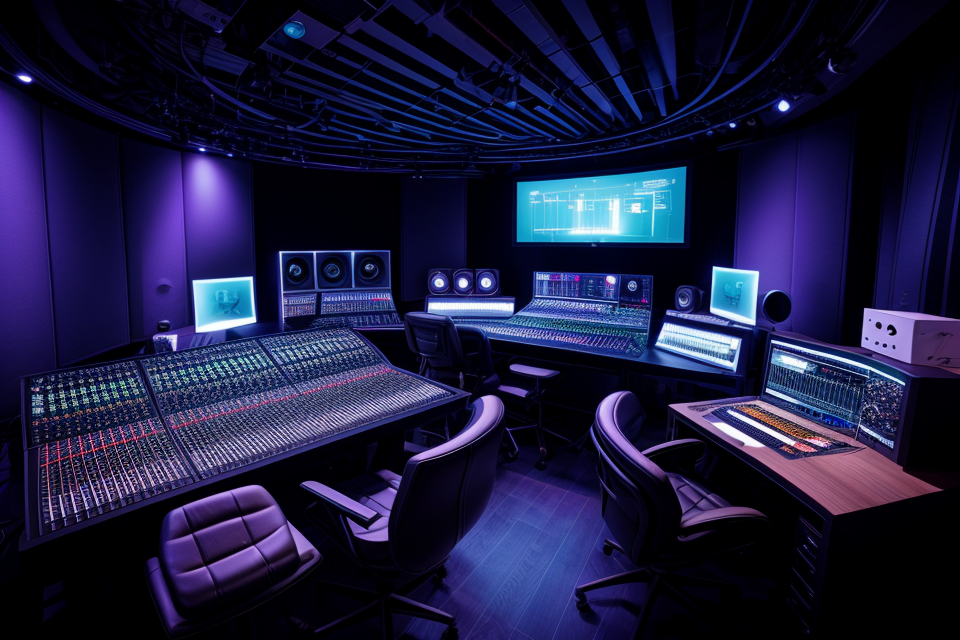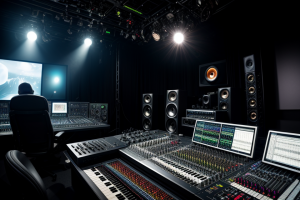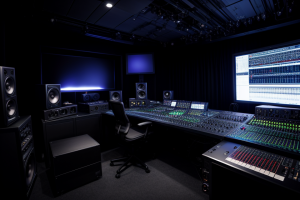
Are you ready to delve into the fascinating world of sound engineering? This exciting career path may seem like a walk in the park, but it’s far from it. From the intricate details of sound systems to the pressure of live performances, being a sound engineer requires a unique blend of technical skills, creativity, and problem-solving abilities. In this article, we’ll explore the challenges and rewards of a career in sound engineering, as we discover what it takes to become a successful sound engineer. So, buckle up and get ready to learn about the ups and downs of this thrilling profession!
What is Sound Engineering?
The Role of a Sound Engineer
A sound engineer is responsible for capturing, mixing, and reproducing sound in various settings, including recording studios, live events, and film productions. Their role is crucial in ensuring that the audio quality is top-notch and meets the creative vision of the artist or client. Here are some of the key responsibilities of a sound engineer:
- Setting up and operating audio equipment, such as microphones, mixers, and loudspeakers
- Adjusting audio levels and balancing sound frequencies to achieve the desired sound quality
- Recording and mixing audio tracks to create a polished final product
- Collaborating with artists, musicians, and other professionals to understand their creative vision and translate it into sound
- Troubleshooting and problem-solving technical issues that may arise during a recording or live event
- Staying up-to-date with the latest audio technology and industry trends
As you can see, the role of a sound engineer is multifaceted and requires a diverse set of skills, including technical expertise, creativity, and collaboration.
The Skills Required for Sound Engineering
Sound engineering is a technical and creative field that involves the manipulation of sound waves to produce high-quality audio for various applications, including music production, film and television, and live events. To succeed in this field, one must possess a unique combination of technical expertise and artistic sensibility. The following are some of the skills required for a career in sound engineering:
- Attention to Detail: Sound engineers must have a keen ear for detail and be able to identify and correct even the smallest of sound anomalies. This requires a meticulous approach to work and a dedication to achieving the highest possible standards of audio quality.
- Technical Knowledge: Sound engineers must have a deep understanding of the technical aspects of sound reproduction, including acoustics, audio processing, and digital signal processing. They must also be familiar with a range of audio equipment, including microphones, mixers, and digital audio workstations (DAWs).
- Creativity: While sound engineering is a technical field, it also requires a great deal of creativity. Sound engineers must be able to think outside the box and come up with innovative solutions to technical challenges. They must also have a keen sense of aesthetics and be able to balance technical considerations with artistic goals.
- Communication Skills: Sound engineers must be able to communicate effectively with a range of stakeholders, including musicians, producers, directors, and technical staff. They must be able to explain complex technical concepts in simple terms and work collaboratively with others to achieve creative goals.
- Problem-Solving Skills: Sound engineers must be able to troubleshoot technical problems quickly and efficiently. They must be able to diagnose and solve problems with audio equipment, as well as address any issues that arise during live events or recordings.
In summary, a career in sound engineering requires a unique combination of technical expertise, artistic sensibility, and interpersonal skills. Those who possess these skills can thrive in this challenging and rewarding field.
The Challenges of Being a Sound Engineer
Physical Demands of the Job
Sound engineering is a profession that requires physical strength and endurance. It is not a job that can be done sitting in an office or working on a computer all day. The physical demands of the job can be challenging, but they are also part of what makes it rewarding.
Some of the physical demands of being a sound engineer include:
- Lifting and moving heavy equipment such as speakers, amplifiers, and mixing boards.
- Setting up and tearing down sound systems for events and concerts.
- Standing for long periods of time, sometimes in cramped or awkward positions.
- Working in loud environments, which can cause hearing damage over time.
- Working under tight deadlines and high-pressure situations.
Being a sound engineer requires a certain level of physical fitness and stamina. It is not a job for someone who is not comfortable with physical labor or working in challenging environments. However, for those who are up to the challenge, the physical demands of the job can be a source of pride and accomplishment.
Technical Challenges
Being a sound engineer requires a deep understanding of the technical aspects of sound production. Here are some of the technical challenges that sound engineers face:
- Microphone Techniques: Sound engineers must have a good understanding of microphone techniques, including the use of different types of microphones, microphone placement, and microphone polarity. This requires a good ear for sound and an understanding of how sound waves behave in different environments.
- Signal Flow: Sound engineers must have a thorough understanding of signal flow, which refers to the path that sound takes from the source to the final output. This includes understanding the various pieces of equipment that are used to process sound, such as mixers, processors, and effects units.
- Acoustics: Sound engineers must have a good understanding of acoustics, including how sound behaves in different environments and how to optimize the sound in a given space. This requires an understanding of room acoustics, sound propagation, and sound absorption.
* Recording Techniques: Sound engineers must have a good understanding of recording techniques, including the use of different types of recording equipment, such as analog and digital recorders, and how to capture high-quality sound. This requires an understanding of the physics of sound and how to translate it into an electrical signal. - Editing and Mixing: Sound engineers must have a good understanding of editing and mixing techniques, including how to edit and manipulate sound using software, and how to mix multiple tracks to create a cohesive final product. This requires an understanding of signal processing and an ability to hear and analyze sound in great detail.
These technical challenges require sound engineers to have a high level of skill and expertise in order to produce high-quality sound. They must be able to work with a wide range of equipment and techniques, and be able to adapt to new technologies and techniques as they emerge. Additionally, they must be able to work well under pressure, as sound engineering often involves working with tight deadlines and demanding clients.
Creative Demands
Sound engineering requires a high level of creativity, as sound engineers are responsible for creating and enhancing the sound for a variety of media, including music, film, and television. The role of a sound engineer is not simply to record and mix audio, but to use their technical skills and artistic judgement to enhance the overall quality of the sound.
One of the key challenges of a career in sound engineering is the need to be constantly creative and innovative. Sound engineers must be able to think outside the box and come up with new and original ideas for how to enhance the sound of a project. This requires a deep understanding of the technical aspects of sound and a keen ear for the nuances of different types of music and audio.
Another challenge of a career in sound engineering is the need to work collaboratively with other professionals in the industry. Sound engineers must be able to communicate effectively with musicians, producers, and other members of the creative team to ensure that the final product meets the desired standards of quality. This requires strong interpersonal skills and the ability to work well under pressure.
In addition to these challenges, sound engineers must also be able to keep up with the latest technology and techniques in the field. The world of sound engineering is constantly evolving, and professionals in this field must be able to adapt to new equipment and software as needed. This requires a commitment to ongoing learning and professional development.
Overall, a career in sound engineering can be both rewarding and challenging. Those who are interested in pursuing this path should be prepared to face a range of obstacles, including the need to be creative, collaborative, and adaptable. However, for those who are passionate about sound and dedicated to their craft, the rewards of a career in sound engineering can be truly immense.
The Rewards of Being a Sound Engineer
Personal Satisfaction
As a sound engineer, one of the most rewarding aspects of the job is the personal satisfaction that comes from creating high-quality audio that resonates with listeners. The ability to manipulate sound and create an immersive experience for audiences can be incredibly fulfilling. Additionally, sound engineers often have the opportunity to work on a wide variety of projects, from live events to film and television productions, which can keep their work fresh and exciting.
Opportunities for Advancement
Sound engineering is a dynamic field that offers a wide range of opportunities for growth and advancement. With the increasing demand for high-quality audio production across various industries, the career prospects for sound engineers are promising. In this section, we will explore the various opportunities for advancement that sound engineers can pursue throughout their careers.
One of the most significant advantages of pursuing a career in sound engineering is the opportunity to work on diverse projects. Sound engineers can work in various industries, including music, film, television, theater, and live events. As they gain experience and develop their skills, they can specialize in a particular area and work on more complex projects.
Another opportunity for advancement is the chance to work with renowned artists and musicians. Sound engineers can work on high-profile projects, such as recording albums for famous artists or providing audio for major live events. These opportunities can lead to recognition and exposure in the industry, which can open doors for future job opportunities.
Furthermore, sound engineers can advance their careers by acquiring new skills and certifications. They can enroll in courses and workshops to learn new techniques and technologies, such as digital audio workstations (DAWs) and sound design software. Additionally, they can obtain certifications from industry organizations, such as the Audio Engineering Society (AES), which can demonstrate their expertise and commitment to the field.
In addition to these opportunities, sound engineers can also advance their careers by taking on leadership roles. They can become project managers, supervising teams of sound engineers and overseeing the production process. Alternatively, they can become entrepreneurs and start their own audio production companies, managing projects and clients.
Overall, the opportunities for advancement in sound engineering are vast and varied. Sound engineers can work on diverse projects, collaborate with renowned artists, acquire new skills and certifications, and take on leadership roles. These opportunities make sound engineering a rewarding and fulfilling career path for those who are passionate about audio production.
Financial Rewards
As a sound engineer, you can expect to earn a competitive salary, especially if you have experience and a strong skill set. The amount you can earn will depend on factors such as the size of the events you work on, the number of clients you have, and the region in which you work.
According to the Bureau of Labor Statistics, the median annual wage for audio and video equipment technicians, which includes sound engineers, was $49,920 in May 2020. However, the top 10% of earners in this field made more than $84,650.
Additionally, there are opportunities for freelance work, which can allow you to earn a higher hourly rate and have more control over your schedule. However, freelance work also means that you’ll need to find your own clients and manage your own business, which can be challenging at times.
In general, the financial rewards of a career in sound engineering can be significant, especially for those who are highly skilled and work on high-profile projects. However, it’s important to keep in mind that this field also requires a lot of hard work and dedication, and it may not be suitable for everyone.
How to Become a Successful Sound Engineer
Education and Training
A successful career in sound engineering requires a combination of technical knowledge, creativity, and problem-solving skills. To achieve this, aspiring sound engineers must undergo extensive education and training to acquire the necessary skills and knowledge. Here are some of the ways to become a successful sound engineer:
- Formal Education: A formal education in sound engineering, music production, or a related field is essential for building a strong foundation in the field. This can be achieved through a Bachelor’s or Master’s degree program in sound engineering, music production, or music technology. These programs offer comprehensive courses in acoustics, electronics, digital audio workstations (DAWs), and audio equipment operation. They also provide hands-on training through internships and practical sessions, enabling students to develop practical skills in sound engineering.
- Vocational Training: Vocational training is another way to acquire the necessary skills and knowledge to become a successful sound engineer. Vocational training programs are typically shorter and more intensive than formal education programs, and they focus on specific aspects of sound engineering, such as live sound, recording, or music production. These programs are designed to provide students with practical, hands-on experience in real-world sound engineering scenarios.
- Apprenticeship: Apprenticeship is a great way to learn from experienced sound engineers and gain practical experience in the field. Apprenticeship programs offer on-the-job training, where aspiring sound engineers work alongside experienced professionals to learn the ropes of sound engineering. These programs are often sponsored by industry organizations or trade unions and provide apprentices with the opportunity to gain valuable experience and develop their skills in a real-world setting.
- Online Courses: Online courses are becoming increasingly popular as a way to learn sound engineering. These courses offer flexibility and convenience, allowing students to learn at their own pace and from anywhere in the world. Online courses cover a wide range of topics, from basic audio recording and mixing to advanced concepts like audio editing and mastering. They are a great way to supplement formal education or vocational training or to learn new skills and techniques.
In summary, becoming a successful sound engineer requires a combination of formal education, vocational training, apprenticeship, and online courses. By pursuing one or more of these pathways, aspiring sound engineers can acquire the necessary skills and knowledge to succeed in the field.
Gaining Experience
One of the most important aspects of becoming a successful sound engineer is gaining experience. This can be achieved through a variety of methods, including internships, apprenticeships, and working on a variety of projects. Here are some ways to gain experience in the field of sound engineering:
- Internships: Many audio engineering schools and universities offer internships to their students. These internships provide an opportunity to gain hands-on experience in a professional setting and learn from experienced engineers.
- Apprenticeships: Some companies offer apprenticeships to aspiring sound engineers. These programs typically last for a year or more and involve working closely with experienced engineers to learn the ropes of the industry.
- Volunteer Work: Volunteering your time and skills at local events or venues can be a great way to gain experience and make connections in the industry. This can include working on concerts, festivals, or other events where sound engineering is required.
- Freelance Work: As a freelance sound engineer, you can work on a variety of projects, from small events to large concerts and festivals. This can provide valuable experience and help you build a reputation in the industry.
- Collaboration: Collaborating with other sound engineers and professionals in the industry can also be a great way to gain experience and learn new techniques. This can include working on projects together or simply talking shop and exchanging ideas.
Overall, gaining experience is essential for becoming a successful sound engineer. It allows you to develop your skills, learn from experienced professionals, and build a reputation in the industry.
Building a Network
In the fast-paced and competitive world of sound engineering, building a network of industry professionals and colleagues is essential for success. Networking can provide opportunities for learning, collaboration, and job opportunities, as well as a support system for navigating the challenges of the field. Here are some ways to build a strong network in the sound engineering industry:
- Attend industry events and conferences: Attending industry events and conferences is a great way to meet and connect with other professionals in the field. These events often feature workshops, panel discussions, and networking opportunities, making it easy to strike up conversations and make new connections.
- Join professional organizations: Joining professional organizations, such as the Audio Engineering Society (AES) or the Recording Academy, can provide access to industry resources, networking opportunities, and educational events. These organizations often have local chapters, which can be a great way to get involved and meet other professionals in your area.
- Participate in online forums and social media groups: Online forums and social media groups, such as the Sound Design and Audio Production Facebook group, can provide a platform for connecting with other professionals and discussing industry topics. These groups can be a great resource for learning about new technologies and techniques, as well as for sharing ideas and getting feedback on your work.
- Collaborate on projects: Collaborating on projects with other professionals can be a great way to build relationships and learn from others in the field. Reach out to other professionals and propose collaborations on projects, whether it’s a music recording, sound design for a film, or an audio installation.
- Volunteer for industry events: Volunteering for industry events, such as music festivals or audio conventions, can provide opportunities to meet and work with other professionals in the field. It can also provide valuable experience and skills that can be added to your resume.
Overall, building a network in the sound engineering industry requires a proactive approach and a willingness to engage with others. By attending events, joining organizations, participating in online forums, collaborating on projects, and volunteering for industry events, you can build a strong network of industry professionals and colleagues that can provide opportunities for learning, collaboration, and job opportunities.
Continuing Education
In the fast-paced and ever-evolving world of sound engineering, it is essential to engage in continuing education to stay updated with the latest technological advancements and industry standards. Here are some ways to pursue continuing education in sound engineering:
- Attend workshops and seminars: Participating in workshops and seminars conducted by industry professionals can provide valuable insights into the latest techniques and tools used in sound engineering. These events often cover topics such as audio post-production, sound design, and live sound reinforcement.
- Enroll in online courses: There are numerous online courses available that cater to various aspects of sound engineering. These courses offer flexible scheduling and can be completed at one’s own pace. Some popular online platforms offering sound engineering courses include Coursera, Udemy, and LinkedIn Learning.
- Network with professionals: Networking with experienced sound engineers can help individuals learn from their experiences and gain insights into the industry. Attending industry events, joining professional organizations, and participating in online forums are excellent ways to connect with like-minded professionals.
- Keep up with industry publications: Staying updated with the latest trends and technologies in the sound engineering industry can be achieved by regularly reading industry publications. These publications often feature articles on new products, techniques, and industry news. Examples of such publications include Sound & Video Contractor, Mix, and Pro Sound News.
- Participate in internships and apprenticeships: Gaining practical experience through internships and apprenticeships can be highly beneficial for individuals looking to build their skills in sound engineering. These opportunities provide hands-on experience and allow individuals to learn from experienced professionals in a real-world setting.
By engaging in continuing education, sound engineers can stay ahead of the curve and maintain their competitive edge in the industry.
The Bottom Line
To become a successful sound engineer, it is important to understand the fundamental principles of sound and acoustics. This includes having a solid understanding of how sound waves behave, how they are recorded, and how they can be manipulated to create the desired effect.
In addition to technical knowledge, it is also important to have strong communication and interpersonal skills. Sound engineers work closely with musicians, producers, and other members of a production team, so the ability to effectively communicate and collaborate is essential.
Finally, it is important to have a passion for music and a desire to constantly learn and improve. The field of sound engineering is constantly evolving, and successful engineers must be willing to adapt and stay up-to-date with the latest technologies and techniques.
Final Thoughts
A career in sound engineering can be both challenging and rewarding. It requires a combination of technical skills, creativity, and passion for music. To become a successful sound engineer, it is important to have a solid understanding of audio equipment and technology, as well as a keen ear for sound and music.
In addition to technical skills, sound engineers must also possess strong communication and collaboration skills, as they often work closely with musicians, producers, and other members of a recording or live sound team. It is also important for sound engineers to be adaptable and able to work well under pressure, as the nature of the job can be fast-paced and unpredictable.
Ultimately, success in sound engineering requires a combination of hard work, dedication, and a willingness to constantly learn and adapt to new technologies and techniques. With the right combination of skills and passion, anyone can achieve success in this exciting and rewarding field.
FAQs
1. What does a sound engineer do?
A sound engineer is responsible for capturing, manipulating, and reproducing sound for various mediums such as music recordings, live performances, films, and television shows. They use specialized equipment and software to adjust and balance the audio, ensuring that it sounds clear and coherent. Sound engineers work closely with musicians, performers, and directors to achieve the desired sound and tone for each project.
2. What skills do I need to become a sound engineer?
To become a sound engineer, you need to have a good understanding of acoustics, sound manipulation, and audio equipment. You should also have strong technical skills, including proficiency in using digital audio workstations (DAWs) and other audio software. Good communication and collaboration skills are also essential, as sound engineers often work closely with musicians, producers, and other professionals in the industry.
3. Is it hard to become a sound engineer?
Becoming a sound engineer requires a combination of technical knowledge, practical skills, and experience. It can be challenging to learn all the necessary skills and equipment, but with dedication and practice, it is possible to become proficient in sound engineering. It’s important to be willing to learn and continuously improve your skills, as technology and techniques in the industry are constantly evolving.
4. What kind of education do I need to become a sound engineer?
While formal education is not always required to become a sound engineer, pursuing a degree or certification program in audio engineering or a related field can provide valuable knowledge and skills. Many colleges and universities offer programs in audio production, sound engineering, or music technology. Alternatively, you can gain practical experience by interning or apprenticing with a professional sound engineer or audio production company.
5. What are the job prospects for sound engineers?
The job prospects for sound engineers are generally positive, as the demand for skilled audio professionals continues to grow with the increasing popularity of music, film, and multimedia content. Sound engineers can find work in a variety of settings, including recording studios, live venues, film and television production companies, and software development firms. With experience and a strong portfolio of work, sound engineers may also have the opportunity to freelance or work independently.







